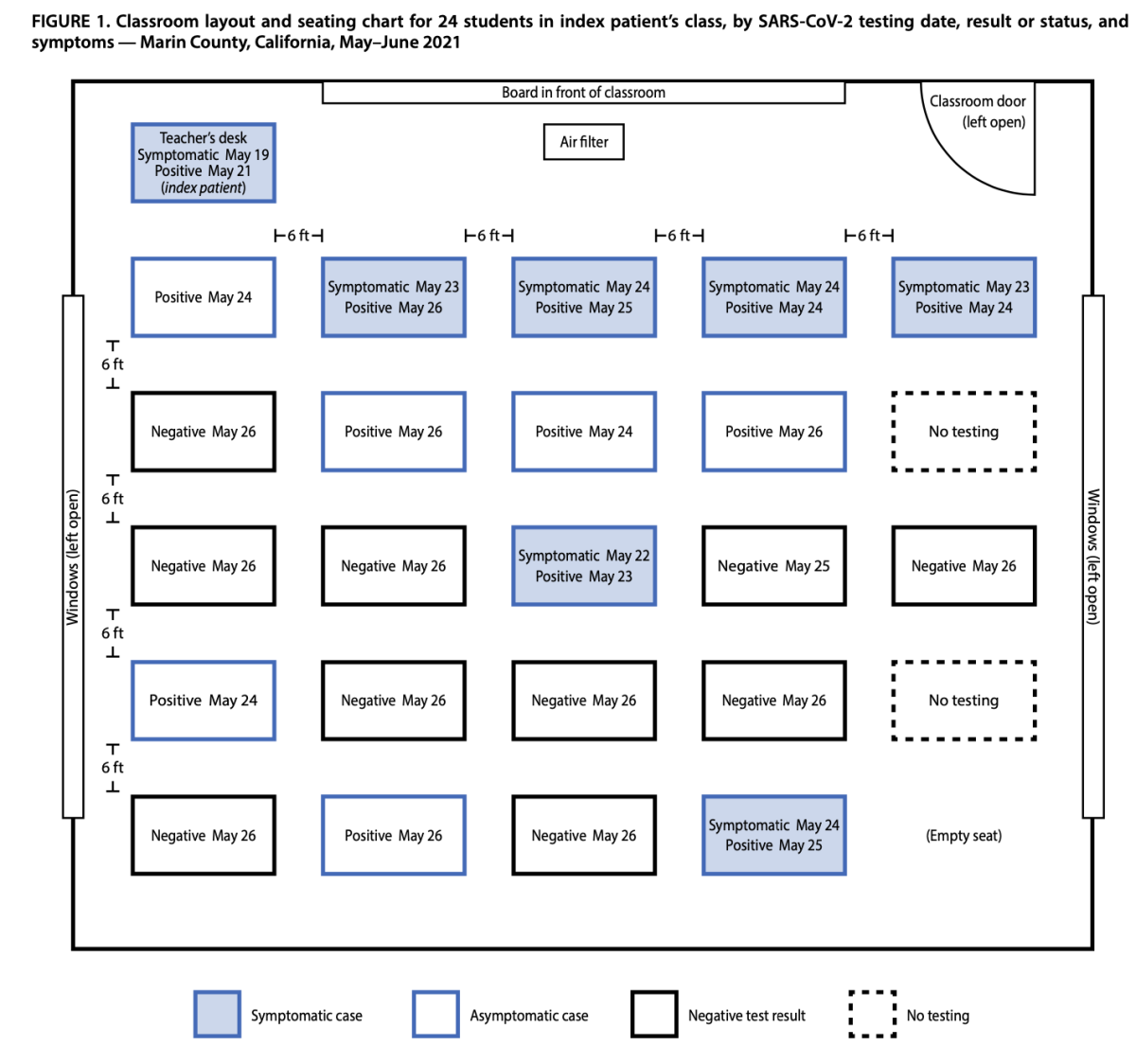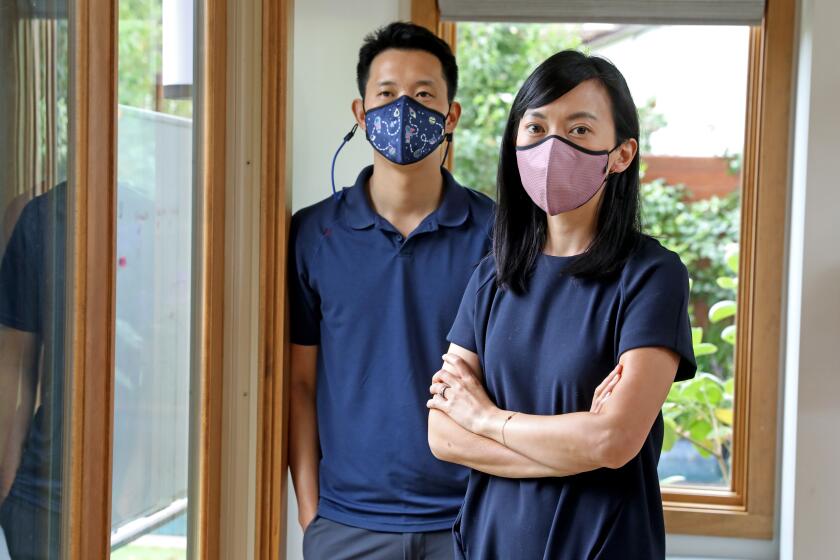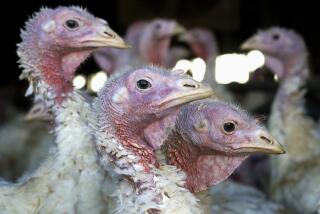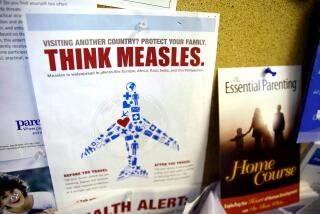How one unvaccinated, unmasked teacher spread coronavirus to students and parents
- Share via
An unvaccinated, unmasked California elementary school teacher who came to school in May even while visibly sick infected a dozen students with the coronavirus, all too young to be immunized, according to a report published Friday by the U.S. Centers for Disease Control and Prevention.
The teacher, who works at a K-8 elementary school in Marin County, was one of only two staff members that had not been vaccinated. Among the teacher’s 24 students, 22 were tested and 12 tested positive for the coronavirus, according to the report, written by county health officials and experts with UC Berkeley, UC Davis and UC Santa Cruz.
Four parents of children at the school were later infected in the outbreak, which involved the Delta variant, according to the report. Of the infected parents, one was unvaccinated, while three were vaccinated. Vaccinated parents in the outbreak experienced symptoms including fever, chills, cough, headache and loss of smell.
No one identified in the outbreak required hospitalization.
Most of the students sitting closest to the front of the class were infected. A minority of those sitting at the back of the class were infected. The teacher reportedly read aloud to students while unmasked, despite rules requiring teachers to be masked indoors, the report said.
Happy Masks’ face coverings for kids are a back-to-school sensation amid heightened COVID-19 anxiety — but good luck buying one.
The teacher started feeling symptoms on May 19 of nasal congestion and fatigue and attributed them to allergies, according to the report. The teacher at some point began coughing, suffered a headache and seemed to experience symptoms of fever.
Nonetheless, the teacher continued working through May 21, the same day the teacher went to get tested for the coronavirus, the report said. The teacher informed the school on May 23 that the test was positive and self-isolated for a week.
The teacher’s students began falling ill on May 22.

“This outbreak of COVID-19 that originated with an unvaccinated teacher highlights the importance of vaccinating school staff members who are in close indoor contact with children ineligible for vaccination,” the authors of the report wrote. “The outbreak’s attack rate highlights the Delta variant’s increased transmissibility and potential for rapid spread, especially in unvaccinated populations such as schoolchildren too young for vaccination.”
The scientists who wrote the report said the results show why it is so important that universal masking inside schools is widely recommended; in California, masking is required in indoor school settings.
“New evidence of the Delta variant’s high transmissibility, even among fully vaccinated persons, supports recommendations for universal masking in schools,” the authors wrote. “Strict adherence to ... masking, routine testing, facility ventilation and staying home when symptomatic are important to ensure safe in-person learning in schools.”
The outbreak’s impact on the broader community may have been limited by Marin County’s high vaccination rate, one of the best in California. At the time of the outbreak, 72% of eligible people had been fully vaccinated in the city where the school is located, according to the report.
In all, 27 coronavirus cases were identified in this outbreak, including the teacher. Besides the dozen students in the teacher’s class, 10 other students at the school also later tested positive for the coronavirus.
Four of them had siblings in the infected teacher’s class and were likely exposed to the virus at home, according to the report.
The other six students were in a different grade and classroom from the one where the outbreak began. It was not clear how they became infected. The two classrooms were separated by “a large outdoor courtyard with lunch tables that were blocked off from use with yellow tape.” All classrooms were equipped with high-efficiency air filters and the doors and windows were kept open.
Analysis of the viruses indicated that all the student infections “likely were part of the same outbreak,” the report said.
A second report published by the CDC’s Morbidity and Mortality Weekly Report on Friday found that in Los Angeles County, coronavirus case rates among children attending school from September through March were dramatically lower than among children overall across the county during the worst months of the fall-and-winter surge. Many schools in L.A. County were closed for in-person instruction for long stretches of the last academic year, though some students did return to in-person instruction.
“In schools with safety protocols in place for prevention and containment, case rates in children and adolescents were 3.4 times lower during the winter peak compared with rates in the community,” that report said.
The authors of the study did note limitations to the analysis. The study was conducted using data from before the Delta variant became the dominant strain. The authors also did not factor in potential differences in demographic and socioeconomic factors. But the trends, they said, were similar across all eight of L.A. County’s “service planning areas” as defined by the county Department of Public Health.
“The findings suggest that implementing recommended prevention measures might protect children, adolescents, and adults from COVID-19” in elementary, middle and high schools, said the scientists who wrote the study, who work for the county health department’s office of education.
“A multipronged prevention strategy, including masking, physical distancing, testing, and most recently vaccination of children and adolescents aged [12 years or older] will remain critical to reducing transmission as more students return to the classroom,” the authors said. “These findings from a large and diverse county present preliminary evidence that schools provided a relatively safe environment during the 2020–21 school year.”
More to Read
Sign up for Essential California
The most important California stories and recommendations in your inbox every morning.
You may occasionally receive promotional content from the Los Angeles Times.











